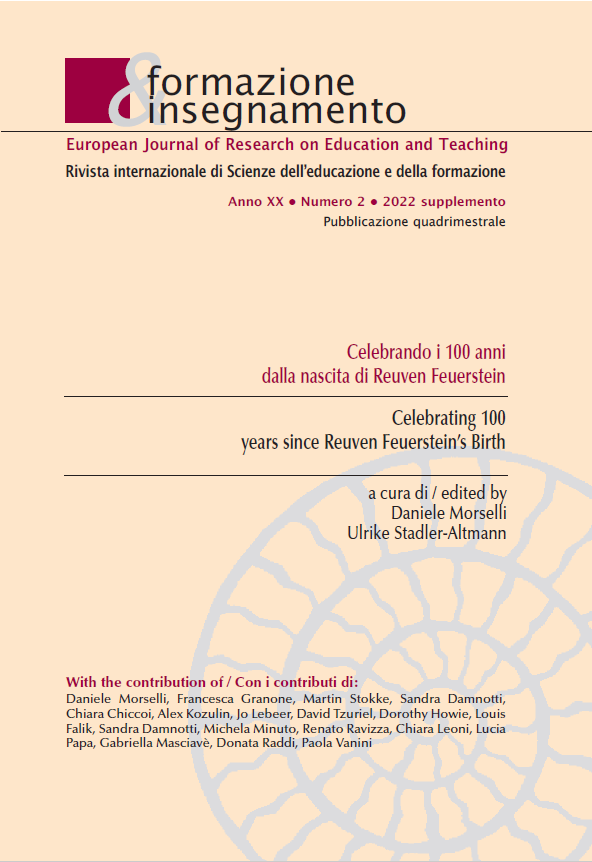The Training Experience of IRRSAE-ER to Feuerstein Instrumental Enrichment: Consequences for Teacher Professionalism
DOI:
https://doi.org/10.7346/-feis-XX-02-22_11Keywords:
Teacher training, Teacher professionalism, Mediated Learning Experience, Feuerstein Instrumental Enrichment, Feuerstein methodAbstract
This contribution shows how in 1998 IRRSAE first, then IRRE-Emilia Romagna later, became the first public authorized training centre of the Feuerstein methods in Italy. Next, it highlights the theoretical basis of the Feuerstein method, from the theory of Structural Cognitive Modifiability to the theory of Mediated Learning Experience, as well as the applied approaches - Dynamic Assessment and Instrumental Enrichment, in the standard and basic versions. In the light of hundreds of satisfaction questionnaires filled by teachers during the 11 years of the training activities of IRRSAE/IRRE-ER on the Feuerstein methods, this paper hypothesizes the advantages for teachers not only for their professionalism but also in terms of the relational, socio affective, cognitive, methodological, and didactical spheres. These advantages have had positive effects on the educational relationship between them and the students, on the students’ learning as well as on the classroom instructional climate. The article presents some instruments and concepts that the Feuerstein method offers such as mediation criteria, the phases of the lesson, and the cognitive map. Eventually this paper argues that the most important consequence of these applications was a renewed trust in teachers that they could bring about change in their students, even in the most difficult and deprived learners.
References
Avanzini, G. (1990). Préface. In: Pedagogies de la mediation. Autour du PEI. Programme d'Enrichissement de Professeur Reuven Feuerstein. Lyon: Chronique Sociale.
Cappello, G., & Ranieri, M. (2020). Editoriale: Ciascuno cresce solo se sognato. Media Education, 11(1), 3-4.
Damnotti, S. (2021). Reuven Feuerstein: Storia straordinaria di un uomo straordinario. Milano: Simonelli.
Falik, L. H. (2019). Changing Destinies: The Extraordinary Life and Time of prof. Reuven Feuerstein. Bloomington (IN): Xlibris Corporation.
Feuerstein, R., Rand, Y., Rynders, J.E. (1995) Non accettarmi come sono. Milano: Sansoni.
Feuerstein, R., Feuerstein, R.S., Falik, L. H., & Rand, Y. A. (2002). The dynamic assessment of cognitive modifiability: The Learning Propensity Assessment Device: Theory, instruments and techniques. Jerusalem: ICELP Publications.
Feuerstein, R., Feuerstein, R.S., Falik, L. H., & Rand, Y. A. (2008). Il programma di arricchimento strumentale di Feuerstein. Fondamenti teorici e applicazioni pratiche. Treno: Erickson.
Kopciowski, Y. (2015). Il metodo Feuerstein. L'apprendimento mediato. Brescia: La Scuola.
Pegoretti, G. (2011) The neural basis of cognitive modifiability. In U. Margiotta (a cura di) The Changing Mind. From Neural Plasticity to Cognitive Modificability. (pp. 285-316). Lecce: Pensa MultiMedia.
Vanini, P. (2003) Potenziare la mente? Una scommessa possibile. L’apprendimento mediato secondo il metodo Feuerstein. Brescia: Vannini.
Downloads
Published
How to Cite
Issue
Section
License
Copyright (c) 2022 Paola Vanini

This work is licensed under a Creative Commons Attribution 4.0 International License.
Formazione & insegnamento is distributed under Attribution 4.0 International (CC BY 4.0).
For further details, please refer to our Repository & Archiving Policy, as well as our Copyright & Licensing Terms.





